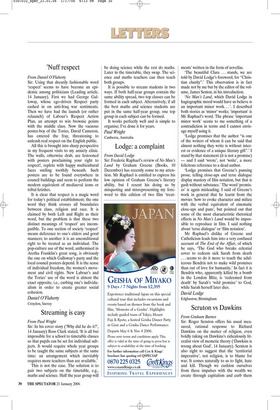Lodge: a complaint
From David Lodge
Sir: Frederic Raphael’s review of No Man’s Land by Graham Greene (Books, 10 December) has recently come to my attention. Mr Raphael is entitled to express his low opinion of Graham Greene’s literary ability, but I resent his doing so by misquoting and misrepresenting my foreword to this edition of two film ‘treat ments’ written in the form of novellas.
‘The beautiful Clara ... stands, we are told by David Lodge’s foreword, for “Christian charity”.’ This observation is in fact made not by me but by the editor of the volume, James Sexton, in his introduction.
‘No Man’s Land, which David Lodge in hagiographic mood would have us believe is an important minor work... ’. I described both stories as ‘minor’ works; ‘important’ is Mr Raphael’s word. The phrase ‘important minor work’ seems to me something of a contradiction in terms and I cannot envisage myself using it.
‘Lodge promises that the author “is one of the writers of whom it can be said that almost nothing they write is without interest or evidence of a unique literary gift”.’ I stand by that statement (it is not a promise) — and I said ‘wrote’, not ‘write’, a more felicitous reference to a dead author.
‘Lodge promises that Greene’s panning prose, telling close-ups and terse dialogue display mastery of film notation, but that is gush without substance.’ The word ‘promises’ is again misleading. I said of Greene’s work in general that he learnt from the movies ‘how to evoke character and milieu with the verbal equivalent of cinematic close-ups and pans’, but pointed out that some of the most characteristic rhetorical effects in No Man’s Land would be impossible to reproduce in film. I said nothing about ‘terse dialogue’ or ‘film notation’.
Mr Raphael’s dislike of Greene and Catholicism leads him into a very confused account of The End of the Affair, of which he says, ‘The God who breaks celestial cover to redeem sick Sarah from death ... seems to do it more to teach the adulterous Bendrix not to make wild promises than out of love for humanity.’ In fact it is Bendrix who, apparently killed by a bomb in the London Blitz, is ‘redeemed from death’ by Sarah’s ‘wild promise’ to God, while Sarah herself later dies.
David Lodge
Edgbaston, Birmingham



















































 Previous page
Previous page